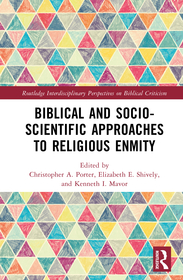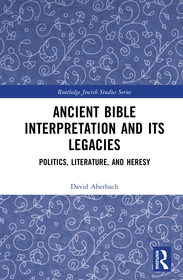
Biblical and Socio-Scientific Approaches to Religious Enmity
Sorozatcím: Routledge Interdisciplinary Perspectives on Biblical Criticism;
-
10% KEDVEZMÉNY?
- A kedvezmény csak az 'Értesítés a kedvenc témákról' hírlevelünk címzettjeinek rendeléseire érvényes.
- Kiadói listaár GBP 145.00
-
69 273 Ft (65 975 Ft + 5% áfa)
Az ár azért becsült, mert a rendelés pillanatában nem lehet pontosan tudni, hogy a beérkezéskor milyen lesz a forint árfolyama az adott termék eredeti devizájához képest. Ha a forint romlana, kissé többet, ha javulna, kissé kevesebbet kell majd fizetnie.
- Kedvezmény(ek) 10% (cc. 6 927 Ft off)
- Kedvezményes ár 62 346 Ft (59 378 Ft + 5% áfa)
Iratkozzon fel most és részesüljön kedvezőbb árainkból!
Feliratkozom
69 273 Ft

Beszerezhetőség
Még nem jelent meg, de rendelhető. A megjelenéstől számított néhány héten belül megérkezik.
Why don't you give exact delivery time?
A beszerzés időigényét az eddigi tapasztalatokra alapozva adjuk meg. Azért becsült, mert a terméket külföldről hozzuk be, így a kiadó kiszolgálásának pillanatnyi gyorsaságától is függ. A megadottnál gyorsabb és lassabb szállítás is elképzelhető, de mindent megteszünk, hogy Ön a lehető leghamarabb jusson hozzá a termékhez.
A termék adatai:
- Kiadás sorszáma 1
- Kiadó Routledge
- Megjelenés dátuma 2025. december 30.
- ISBN 9781032719894
- Kötéstípus Keménykötés
- Terjedelem240 oldal
- Méret 234x156 mm
- Nyelv angol
- Illusztrációk 1 Illustrations, black & white; 1 Halftones, black & white 700
Kategóriák
Rövid leírás:
This book examines how Christian teachings on love and enmity shape group identity and conflict, with scripture and theology used both to justify violence and call for reconciliation. It explores interdisciplinary perspectives that combine socio-scientific approaches with biblical criticism.
TöbbHosszú leírás:
This book examines how Christian teachings on love and enmity shape group identity and conflict, with scripture and theology used both to justify violence and call for reconciliation. It explores interdisciplinary perspectives that combine socio-scientific approaches with biblical criticism.
By exploring historical, biblical, and contemporary examples, this volume illuminates how religious identity influences the construction of enemies and offers tools for critically engaging with faith-based conflict. Drawing on Social Identity Theory, theological analysis, and interdisciplinary research, the book provides a framework for rethinking community engagement across difference. The contributors examine how Christianity metabolizes neighbor-enemy distinctions, addressing the contemporary re-emergence of sharp divisions despite increased global engagement. The chapters leverage insights from psychology, sociology, anthropology, literary criticism, historical analysis, reception history, and classical studies to understand how group self-identification generates both external conflict and internal conformity. This comprehensive approach helps readers understand the seeming intractability of religious enmity while offering pathways toward reconciliation and constructive dialogue in diverse religious contexts.
Biblical and Socio-Scientific Approaches to Religious Enmity is ideal for scholars, students, clergy, and readers in theology, biblical studies, religious ethics, and political theology who seek to understand the intersection of faith, social identity, and enmity. It serves academics exploring socio-cognitive approaches to religious conflict as well as practitioners working to address religious polarization in contemporary communities and interfaith contexts.
TöbbTartalomjegyzék:
Introduction; 1. Reflections from Social Identity Theory on Authoritarianism, Fundamentalism and Narratives of Nationalism and Multiculturalism: From Ezra/Nehemia/Ruth to the Postcolonial Era; 2. From Enmity to Empathy: Paul and (Re)-Defining the Boundaries of “Us-ness”; 3. Adjustments to Mirror Reading: Finding Opponents, or Just an Audience, from a Text; 4. Reconciliation and Joseph’s ‘Power Over’ His Brothers in Genesis 50:15-21; 5. Figuring a Leader: The Depiction of Abijah in 2 Chronicles 13 as Reinforcing Intra-Group Enmity; 6. Identity and Inclusion in Mark’s Gospel: The Case of Jesus and the Syrophoenician Woman (Mark 7:24-30); 7. Desertion or Exclusion: Relationships with the Outgroup in the Johannine Writings; 8. Staging Incest and Identifying the Enemy: Reading 1 Cor 5 in Light of the Black Sheep Effect and Ancient Theatre; 9. ‘They Do Not Keep The Law’ (Galatians 6:13): Forceful Circumcision and the Fruit of the Spirit; 10. Restoring the Enemy? Considering the Pauline Imperative of Galatians 6:1; 11. Borrowing from Peter to pay Paul: Middle Management and the mediation of theological and social capital; 12. Postcolonial perspectives on animosity and enemies in Paul; 13. Judaism, Judeo-phobia, and the Conversion of the Royal House of Adiabene; 14. Degradation ceremonies and the politics of the vaccine mandate: An ethnographic analysis of the Melbourne Construction Industry Protests, September 2021; Index.
Több




